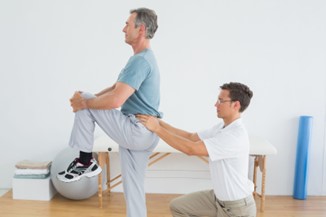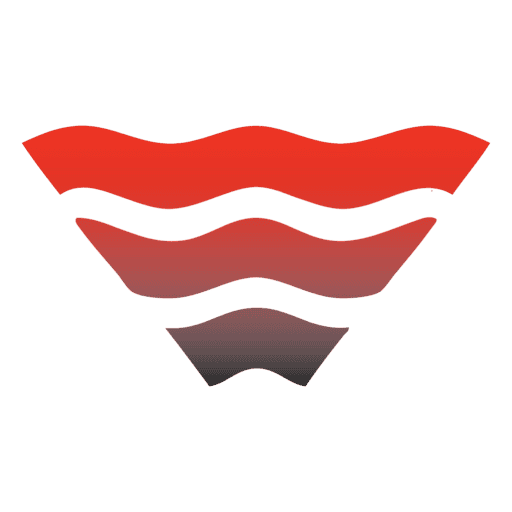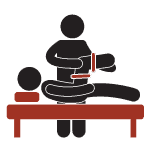Exercise Prescription by Alliston and Tottenham clinics therapists
Contact Us
What are the General Guidelines for different age groups?

- Preschool Aged Children (ages 3-5)
- Children should be physically active throughout their day to enhance growth and development
- Children and Adolescents (ages 6-17)
- Children and adolescents should do 60 minutes or more of moderate to vigorous intensity physical activity daily
- This should include:
- Aerobic: 60 minutes or more of moderate to vigorous intensity aerobic exercise at least 3 times per week
- Muscle strengthening: as part of the 60 minutes of daily activity, they should include muscle strengthening activities at least 3 times per week
- Bone strengthening: as part of the 60 minutes of daily activity, they should include muscle strengthening activities at least 3 times per week
- Adults (ages 18+)
- Adults should do at least 150 to 300 minutes of moderate intensity aerobic activity per week (or 75 to 150 minutes of vigorous intensity aerobic exercise per week)
- Adults should also include muscle strengthening exercises that involve all major muscle groups on 2 or more days per week

- Older Adults (ages 65+)
- Older adults should include multiple components to their weekly physical activity that include aerobic, balance and muscle-strengthening exercises
- Older adults should do 150 minutes of moderate-intensity physical activity per week
It is important to note that these guidelines set out by the ACSM are general guidelines for most ages. Many factors come into play that may determine your recommended physical activity guidelines.
What are some of the factors that may affect your recommended physical activity?
- Current health condition
- Past health conditions
- Comorbidities
- Current level of physical activity
- Age
- Injury
- Personal fitness goals
What is the evidence of physical activity benefits?
There are many benefits to physical activity ranging from cognitive to physical health. Listed below is more recent research on the benefits of physical activity.Improved cognitive function
- Reduce anxiety and depression risk
- Improve sleep
- Reduce risk of falls in older adults
- Reduced risk of cancer
- For pregnant women: reduced risk of gestational diabetes and postpartum depression
- For people with various medical conditions: reduced risk of all-cause mortality and improved quality of life
How to reach the recommended physical activity guidelines and progress past them?
Starting to be physically active can be difficult, however, research shows that any increase in physical activity if beneficial towards our health. The starting point for exercise will vary from person to person. For an individual who is just starting to be physically active, it is recommended they start with light-intensity activity, such as walking around the block. For individuals who are already active, starting to progress gradually to their activity routine is suggested (i.e. increasing by 10-minute bouts at a time).
It is important to note that the risk of injury to bones, muscles, and joints is directly related to the gap between a person’s current level of activity and a new level of activity. This often happens in individuals who perform a new activity or significantly increase the amount they are doing of an activity. For example, a runner who is consistently running 5 km, decides to one day run a 15 km distance and develops plantar fasciitis in their foot.
How to overcome and minimize the risk of injury when starting or progressing with exercise? That is where a physiotherapist comes in. Physiotherapists are experts in exercise prescription – they believe that each individual should get a personalized plan for their physical activity that is based on their current fitness level, goals and taking into consideration their medical health history.
Here is how a physiotherapist may approach your exercise prescription

1.Assessment
The physiotherapist will start off by obtaining a medical history from you. They will then perform an objective examination looking at your flexibility, mobility, strength and aerobic capacity. This will help them get an understanding of your current level of function, which will help them in developing your individualized exercise program.
2.Goal Setting
The physiotherapist will have an in-depth discussion with you to determine your goals for treatment and exercise. These goals can range from lifestyle changes to rehabbing an injury to wanting to compete in a sporting event. An example of a goal could be wanting to improve the strength in your shoulder so you can lift your grandkids.
With the information from the assessment and your desired goals, the physiotherapist will work with you to develop your exercise program. They will help to determine the type of exercise (i.e. aerobic, strength, flexibility etc), the intensity of the exercise, the frequency of the exercise (i..e how often to do it), and the duration of the exercise.
4. Monitoring and re-assessment
Within your physiotherapy treatments, they will monitor your progression and perform reassessment to determine if you are safe and able to progress your exercises.
5. Progression
The physiotherapist will advise you on safe and appropriate progression for your exercises. This may include increasing the intensity, frequency or duration of your exercises. This could also include changing the actual exercise to a more challenging one.
Exercise prescription should be individualized and tailored to your specific needs and abilities. A healthcare professional must help you develop an appropriate exercise program, especially if you are suffering from medical conditions.
Contact our physio clinics in Alliston and Tottenham and talk to one of our expert therapists.
MANUAL AND MANIPULATIVE THERAPY
Our therapists use a variety of hands on techniques to both accurately assess and efficiently treat patients. Specialized training through the Orthopaedic Division of the Canadian Physiotherapy Association (orthodiv.org) allows for accurate diagnosis and faster recovery. Fellows of the Canadian Academy of Manipulative Physiotherapists (FCAMPT) have taken extensive post-graduate training and have received international recognition in hands on techniques.
manippt.org
CONCUSSION MANAGEMENT
At South Simcoe Physiotherapy we have training in the Shift Concussion Management Program (shiftconcussion.ca). Using this program as a basis, we thoroughly assess the individual systems often effected in a concussion using a variety of tests, as well as cognitive tools such as imPact. Once an accurate assessment has been performed, we develop a multi-faceted rehabilitation strategy to return the individual to optimal function.
PELVIC HEALTH
massage therapy
Massage therapy is a form of hands in treatment that affects the body’s soft tissues such as the muscles, connective tissue, ligaments, tendons and joints. Massage therapy can have therapeutic effects on the muscular, circulatory, and nervous systems. For more information on Registered massage therapy please visit: www.rmtao.com
acupuncture
Acupuncture is rooted in Traditional Chinese Medicine and uses tiny needles which are inserted into various points in the body. Acupuncture stimulates the body’s natural healing mechanisms and is effective in treating a variety of conditions including headaches, back pain, neck pain, various overuse and sports injuries. Our therapists have training in acupuncture through Acupuncture Canada ( https://www.acupuncturecanada.org)
RUNNING ASSESSMENT / GAIT ANALYSIS
Gait analysis and Running Assessments can be useful in determining biomechanical irregularities during either walking or running that are either causing or are caused by a certain condition or injury. Gait analysis can also help to identify inefficiencies that may be reducing performance in runners and perhaps predisposing or contributing to injury.
We use multiple tools to analyze a person’s gait. First, we use our physiotherapy backgrounds and knowledge of biomechanics. By observing someone walking/running/using the treadmill (and perhaps recording them) we can often identify these major faults. A biomechanical exam can also aid in this process through identifying structural limitations, muscle weakness and tone, and a variety of other potential faults. Finally, using training from courses such as those taught at The Running Clinic https://therunningclinic.com/en, can help to consolidate all of this information while allowing us to make recommendations on items such as footwear, training schedules, and other information relevant to your specific situation.
IMS/IDN
Intramuscular Stimulation and Integrated Dry-Needling. Both IMS and IDN are forms of dry needling where an acupuncture needle is inserted into a taut band in a shortened muscle or near the nerve root in order to cause a reflex relaxation of the muscle, a micro trauma to stimulate natural healing and create an action potential to restore normal nerve conduction. This technique can be extremely useful to treat chronic pain, myofascial pain syndromes, many sports injuries, and overuse injuries. For more information visit: www.istop.org
exercise prescription
Exercise is an essential part of all rehabilitation programs. In order to restore normal muscle length and strength, correct biomechanical faults and return to function, exercises need to be specifically tailored to suit individual needs.
custom bracing
Our clinic is pleased to offer custom braces to aid in conditions such as ACL tears, meniscus injuries, knee osteoarthritis and more. View our selection of products at www.kratoshealth.ca
shockwave therapy
Shockwave is a non-invasive way to treat many muscular, tendinous, ligamentous, and bone problems that lead to pain and loss of function. Briefly stated it uses strong energy pulses to stimulate increased blood flow and metabolism allowing regeneration of damaged tissue. A phenomenon called “micro-cavitation” occurs where “bubbles’ expand and burst creating a force that penetrates damaged tissue and stimulates cell reparation. Shockwave is especially effective in treating issues that have been unresponsive to other conservative methods.
VIDEO AND TELEPHONE CONSULTATIONS
At a time when social distancing is necessary, we are pleased to be able to offer our exceptional care in an alternative method. Video consultations (think FaceTime or Skype) can be an effective method to assess and treat musculoskeletal and other physiotherapy appropriate impairments. A thorough analysis can be conducted by performing a detailed subjective, observing individual movements, performing simple tasks and special tests, and evaluating the environmental factors which are aggravating the condition. From there, our therapist can devise an appropriate treatment plan including self management strategies, modifications, and exercises appropriate to address your condition. The therapist is easily able to demonstrate the exercises and observe you performing them, and can even send you video demonstrations of the exercises. For those that are unable to access reliable internet, or do not regularly use a computer, telephone consults are also an option.
No doctor's referral is necessary and these sessions are covered by most insurers
NATUROPATHY
Frequently Asked Questions
What is physiotherapy?
Simply stated, physiotherapy is the treatment of deficits and disease without the use of medications. Physiotherapy is useful for the majority of injuries and ailments one might suffer. The goal of our physiotherapists is to reduce your symptoms and allow you to return to function in a timely manner. If you are unsure if your condition is appropriate for physiotherapy, please feel free to contact us.
How do I pay for your services?
Does OHIP cover physiotherapy?
Do I need a doctor’s referral to come and see you?
What do I need to wear for my assessment?
Will my private insurance cover the cost of this treatment?
What if my injuries are as a result of a motor vehicle accident or workplace injury?
- Date of accident
- Claim number
- Adjuster’s name and contact information
- Private health insurance information (if applicable)
- Area of injury
We are able to direct bill your motor vehicle insurance, but please note that all of your private health insurance must be used prior to accessing your motor vehicle insurance. These rules are mandated by the Financial Services Commission of Ontario and not our clinic.
Workplace injury (WSIB): we often treat people as a result of a workplace injury, however, we do not bill WSIB directly. If your injury is part of a WSIB claim, you are expected to pay just as other clients and then submit your invoices to WSIB.


